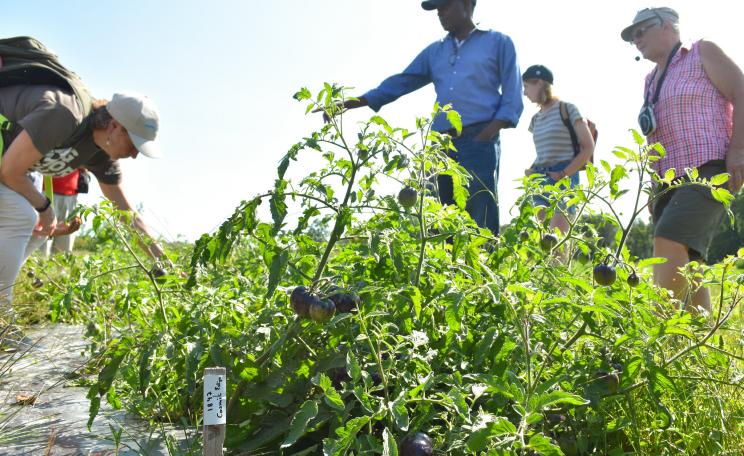Our science and innovation – ecology and systems thinking, progressive sociology and economics – offers constructive ways forward.
The House of Lords will struggle to make the Agriculture Bill fit for purpose in these times of global health crisis, climate emergency and diet failure.
The Lords will also struggle to prevent the rolling-back of European protections to which the UK Government has committed, particularly in relation to genetic engineering.
Complete the Ecologist's 2020 Reader Survey.
The public is very clear in its view on genetically modified organisms (GMOs). We don't want them in our food system.
Innovation
The government left GMOs out of the Bill, and indeed we we were told last week that this isn't the right place to discuss the issue.
But that isn’t stopping the technology's champions from leaping into the fray with an amendment to include it. And we can’t be sure that the government won’t jump on the bandwagon and follow this rightwing-led push.
I was struck by the language being used as I listened to the Second Reading debate in the Lords last week (a general discussion before we get down next month to the line-by-line consideration of Bill and amendments in the Committee Stage) – all the talk of “innovation”, of “science”, and how could anyone be against science and innovation?
Our science and innovation – ecology and systems thinking, progressive sociology and economics – offers constructive ways forward.
The question that is too seldom asked is: which science? Just looking at “science”, you can approach the problem of food security through nutrition or genetics or soil science or agronomy (which crops grow where).
What impact will this scientific innovation have? How will it change our environment, our society, our diet? Unless you’ve asked those questions, your policy is going to have unintended impacts (and even if you do, you need to be alert to unexpected outcomes).
Impacts
These are not questions that you can answer with a test tube or an equation. A 1950s view of “science” - a white man in a lab coat holding nature as far distant as possible - will not provide answers.
These are complex issues of sociology, economics, business. Scientific understanding can only take us so far, as we’ve found in dealing with SARS-CoV-2. And science allowed to run riot, without consideration of the impacts of innovation, can be very dangerous indeed.
It was science that gave us DDT and chlorpyrifos. It was innovation that led to the disastrous takeover of the English countryside by rapeseed, relying on massive use of pesticides and giant scale monoculture that is a biological desert, to grow a crop essentially unsuited to our conditions to please multinational food manufacturers producing foods that contribute to obesity and ill health.
My top level objection to genetic modification technologies is that behind it lies a faulty assumption: that you can change just one thing and create improvements, without having lots of other – frequently unconsidered – impacts.
Complexity
Take an obvious example, like making crops more drought-resistant. Sounds great, how could you argue with that?
But think a little deeper, and the impacts are not just more wheat or more potatoes. If the plants keep growing, they’ll be sucking nutrients out of a drier soil. That will have an impact on the immensely complex ecosystem of bacteria, fungi and microscopic organisms that make up a healthy soil and work synergistically with plants to help them grow.
It will have an impact on soil structure – at risk of making dry soil even more concrete-like and impermeable, with threats of worsening our already high flood risk.
The GM approach is innately a 'silver bullet' approach – treating nature and society like a machine – you pull a lever and have a predictable impact on operations, a mechanistic approach that ecologists and systems analysts, heterodox economists and sophisticated sociologists have long been telling us causes untold damage.
Perhaps due to my Australian origins I’m particularly sensitive to this: introduce the cane toad to eat pests of sugar cane. What could possibly go wrong?
Definition
But it struck me in the debate that those of us on the side of the ecologists and the systems thinkers are falling down in the words we use, in allowing the “other side” to talk as if “science” and innovation are what they are for and we are against.
It is the science of nutrition that tells us how disastrous our ultra-processed diets are – cutting edge, fast-developing, exciting science.
Universal basic income is an innovation, a proposed change to our economic and social arrangement that removes insecurity and fear and reduces mental ill health. We don’t tend to talk about these things in these terms, but we should.
'Science' cannot be narrowly defined, or left in the hands of those who champion the multinational seed and agrochemical companies whose previous choice of 'innovations' has left the natural world and human society in such a parlous state.
Our science and innovation – ecology and systems thinking, progressive sociology and economics – offers constructive ways forward, rather than driving on to destruction.
This Author
Natalie Bennett is a Green Party peer.







